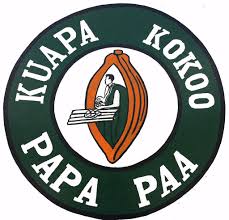Ghanaian cocoa farmer cooperative, Kuapa Kooko, has lost 80 percent of its majority shares in British chocolate brand, Divine Chocolate, to a strategic investor.
Kuapa Kokoo cooperative, which hitherto owned 45% majority shares in the company, would now hold only 20% ownership as Divine Chocolate Limited is sold to a new German owner for capital injection.
In a statement, Caitlin Horner, Divine Chocolate spokesperson said: “We are delighted that Weinrich, under its CEO Cord Budde, is now a key shareholder and are fully committed to our mission to empower cocoa farmers and chocolate lovers by delivering seriously good chocolate.”

She added, “Mr Budde and his company have proved to be exceptional partners to Divine: not only developing and producing all our delicious chocolate flavours, but visiting farmers, hosting Kuapa Kokoo in their factory, building a schoolhouse to add to a school built by Kuapa, investing in establishing Divine USA, and helping in many ways to build our business.”
We are genuinely excited about what the future holds for the company.
Divine Chocolate, a very prominent Fairtrade chocolate brand, was founded in 1998 with Ghana’s Kuapa Kokoo, a founding shareholder, owning 33% shares.
Shares of the Ghanaian cocoa farmer cooperative increased to 45% in 2007 when a fellow founding shareholder, The Body Shop, handed over its shares to Kuapa Kookoo, giving it the majority stake.
Weinrich Takes Over
The new owners of Divine Chocolate, Ludwig Weinrich GmbH & Co. KG (Weinrich), are however not entirely new to the British business.
Weinrich has been manufacturing Divine’s chocolate in Germany from the inception 22 years ago up to now and very much understands the business’s model and social mission.
“To be honest, Divine has changed my life. Yes, that might sound a bit impassioned, but it is true. Divine has brought me much closer to the most important part of our products, the cocoa and the farmers, and most important(ly), made me much more sensitive regarding the needs and the livelihoods of those people who are producing this wonderful cocoa”, Cord Budde, CEO said in a statement on Divine’s website.
The company has not disclosed how much was involved in the transaction, but said in a response to Pioneers Post news portal, “Divine was in a position, like many businesses at present, where it needed external finance and the change in ownership structure allows the business to have access to this finance to continue its operations and grow the business.”
The source assured the Kuako Kokoo cooperative would still have “40% influence” on the company’s board, adding “the objective and goals of Divine will not change and therefore we do not believe the change in our ownership should have an impact on the fundamentals of the business with respect to Fairtrade, B-Corp and being a social enterprise.”
Sophi Tranchell Departs After 21Years
Also related to what it calls a “moment of change”, Divine Chocolate announced the departure of Sophi Tranchell, its CEO in the past 21 years.
Prior to leaving in May, Ms Tranchell who decided to leave since last November, is reported to have been instrumental in “ensuring the company was left in good hands and well-supported for the future”.
Divine described Sophi Tranchell as “a champion of Fairtrade, of business as a force for good, and of women achieving equality, particularly farmers in the chocolate supply chain”.
It added: “She has demonstrated time and time again that things no-one thought possible can be done – starting with creating a chocolate company that turned ‘business-as-usual’ on its head by making farmers the biggest shareholders.”
Commenting on her own departure in the statement Ms Tranchell said, “I am immensely proud of Divine, what it stands for and what it has achieved. With a great team and investors who had the vision and patience to support us, we set out to make a real difference in the chocolate industry – a real transition towards more equitable trade that could never again be un-done.
“I am reassured to be leaving the company with our main manufacturer Weinrich having capitalised the business, in the knowledge that Weinrich’s CEO Cord Budde has been, and continues to be a totally committed partner, sharing Divine’s values and supporting its mission and ambitions”, she added.
Tranchell noted, “working closely with farmers has been an absolute privilege – their lives have enriched mine and hopefully, via the farmers’ stories we have told, other lives have been enriched too. It has been especially rewarding to see the positive impact achieved for women as they are able to step up and take their rightful place in the chocolate story.”
According to her, “Divine’s mission goes on – there is still a lot to do – but farmers’ income is right in the spotlight, as is the urgent need for social, environmental, and economic sustainability, so there is optimism for more positive developments. The social enterprise and B Corporation movements are setting inspiring examples and there is now a critical mass of discerning consumers who expect more of the companies they are buying from.”
Kuapa Kokoo Ventures Into Chocolate Manufacturing

Divine Chocolate was established in 1998 after the farmers of the Kuapa Kokoo cooperative voted at their 1997 Annual General Meeting to set up their own chocolate company.
The cooperative which has a membership of almost 100,000 farmers, is said to have ensured farmers are put first and at the centre.
Divine Chocolate buys all of its cocoa on Fairtrade terms and has committed to investing in farmer-led programmes, particularly focused on improving and adapting farming techniques, empowering women, and supporting good governance.
The farmers-owned chocolate company is not only a Fairtrade leader but also a multi-award-winning social enterprise, a high scoring B Corp, with a brand sold around the world.
Source: thecocoapost




